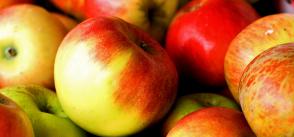
Lebanon’s apple farmers fear planned poverty, economic immigration
Thousands of Lebanon’s mountain farmers rely on the sale of their yearly apple harvest. Without it they would be left without an income to support them through the long, harsh winters. Apple farmers receive little to no governmental support, and have entered the fifth consecutive year of hardship. Amid the growing challenges that have arisen from the border shutdown and the Syrian war, they complain of what they say are planned tactics to push them into bankruptcy and economic immigration.
300,000 farmers put their faith in what the annual harvest season brings them, yet the government’s failure to support the sector has driven them into desperation.
Amid the problems are botched pesticides, which have proven a failure in the fight against rising diseases and pests; lack of subsidies that are pushing them deeper into poverty; and the rise in apple production that came as a result of a failed governmental planning to eradicate cannabis farming in the Bekaa.
While apple farmers were protesting on the streets, the Newsroom Nomad headed to Lebanon’s Baskinta –a village renowned for its apple production. There, we spoke to a local apple farmer, Jean “Joe” Ayoub, who told us about the hardships facing many who rely on the land, and their fears of poverty, and forced economic immigration.
[Full article here | Photo by 1sock]







